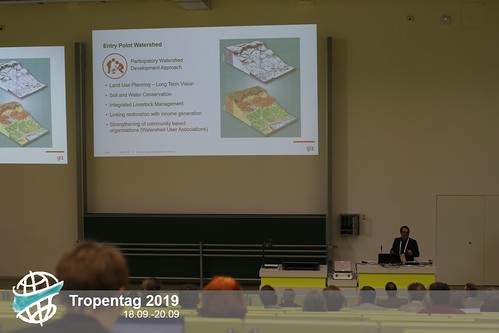The importance of local population on transforming environments
The GIZ’s project in Ethiopia, which began in 2008, shows that engaging local population on transformative actions for environment is more important than implementing techniques alone.

Why don’t some people living in Ethiopia’s rural area have strong livelihoods? Boris Büchler, a researcher funded by GIZ, has a strong suspicion: land degradation. After performing “bigger picture” research, taking into account environment, economic and political dimensions, the main finding that Boris Büchler’s suspicion was correct: land degradation is the main problem weakening rural livelihoods.
As any agriculture specialist would agree, the next steps were to implement techniques to reduce and revert this process, such as rehabilitation of degraded land, controlled and zero grazing and integrated soil fertility management. However, what it was not in science books is that another solution could bring unexpected positive results: the promotion of the local watershed user associations.
The watershed associations are composed by local residents making decisions on how the land should be managed, based on their own vision of how the place they live can be improved. In Ethiopia, after creating the associations and using the techniques in favor of the water development plans, productivity increased by over 20% in 150,000 ha, benefiting around 340,000 inhabitants.
The GIZ project not only supported the creation of the associations, but also legally recognizes them and maintains their activity after the project is over. “It is not only about doing the land green again but unlocking economic opportunities. (…) Local participation and ownership is key”, said Boris. I like to think this is the main take away not only for me, but hopefully also for the people who see social participation as step that slows down the result’s achievement. Instead, local participation is the way to achieve the results.
Learn more about Ethiopia High Lands here


Why don’t some people living in Ethiopia’s rural area have strong livelihoods? Boris Büchler, a researcher funded by GIZ, has a strong suspicion: land degradation. After performing “bigger picture” research, taking into account environment, economic and political dimensions, the main finding that Boris Büchler’s suspicion was correct: land degradation is the main problem weakening rural livelihoods.
As any agriculture specialist would agree, the next steps were to implement techniques to reduce and revert this process, such as rehabilitation of degraded land, controlled and zero grazing and integrated soil fertility management. However, what it was not in science books is that another solution could bring unexpected positive results: the promotion of the local watershed user associations.
The watershed associations are composed by local residents making decisions on how the land should be managed, based on their own vision of how the place they live can be improved. In Ethiopia, after creating the associations and using the techniques in favor of the water development plans, productivity increased by over 20% in 150,000 ha, benefiting around 340,000 inhabitants.
The GIZ project not only supported the creation of the associations, but also legally recognizes them and maintains their activity after the project is over. “It is not only about doing the land green again but unlocking economic opportunities. (…) Local participation and ownership is key”, said Boris. I like to think this is the main take away not only for me, but hopefully also for the people who see social participation as step that slows down the result’s achievement. Instead, local participation is the way to achieve the results.
Learn more about Ethiopia High Lands here






Comments
Post new comment